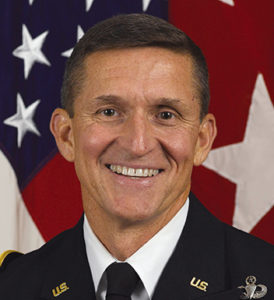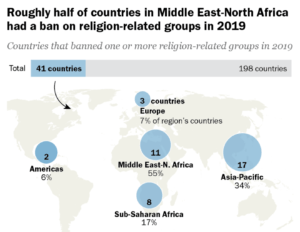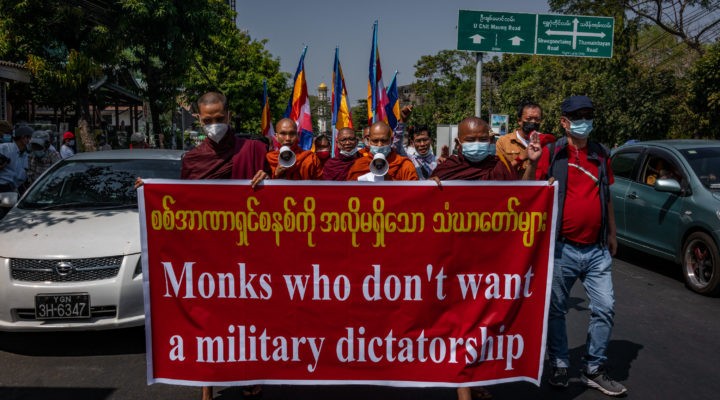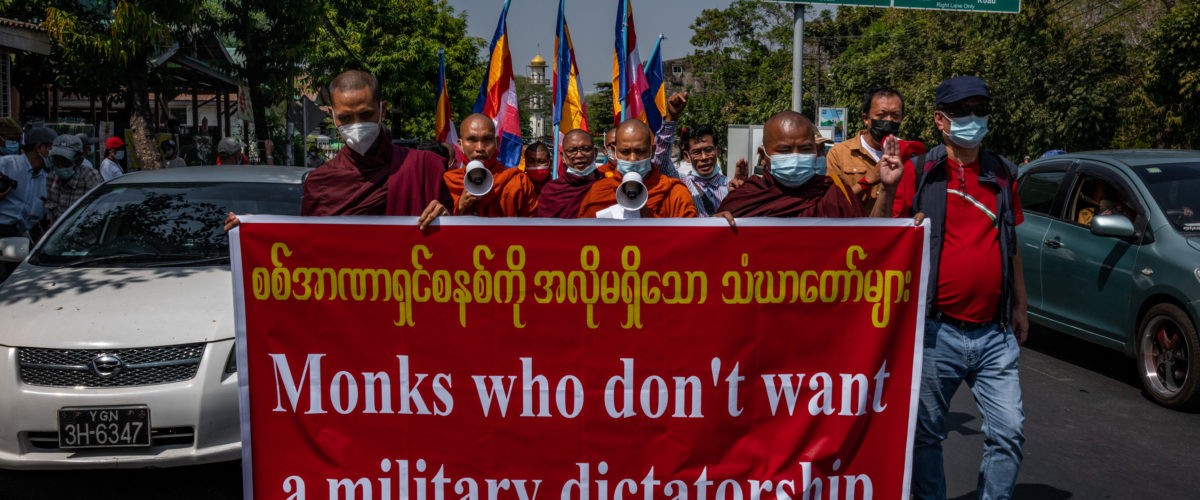If Michael Flynn and his followers get their way, the United States could join the ranks of China, Myanmar, Taliban-controlled Afghanistan and a long list of other nations that ban minority religious traditions highlighted in a new survey by Pew Research.

Michael Flynn
As reported in-depth by BNG, the one-time adviser to former President Donald Trump spoke at a Nov. 14 event in San Antonio, Texas, where he declared: “If we are going to have one nation under God, which we must, we have to have one religion, one nation under God and one religion under God.”
Flynn did not explain how the U.S. would whittle the nation down to just one faith, but his remarks, captured on video and reported internationally, also hinted that only a single form of Christianity would be allowed in his America. “If we can have one nation under God, we should have one church under God. Right?”
The real-world implications of that vision can be glimpsed in a survey released Nov. 15 by Pew Research. The study found that 41 of the 198 nations examined in 2019 banned at least one religion — a reality that, if adopted in the U.S., would be ominous for Jews, Hindus, Buddhists, Muslims and other non-Christian groups outside Flynn’s utopian “one religion, one nation” model.
“In many countries, repercussions for membership in banned religious groups can include detention, raids and seizure of property.”
“In many countries, repercussions for membership in banned religious groups can include detention, raids and seizure of property,” Pew staff said in the report that also cited violence and death for members of illegal faiths in some countries.
Condemnation of Flynn’s comments came swiftly from likely — and unlikely — sources. The Anti-Defamation League, B’nai B’rith International, the Zionist Organization of America and the American Jewish Congress predictably condemned the comments. As did Amanda Tyler of Baptist Joint Committee for Religious Liberty.
But criticism also came from Matt Hagee, son of Zionist Christian leader John Hagee and the pastor of the congregation that hosted the Reawaken America Tour Flynn addressed.
“Last week I allowed an event to be held at Cornerstone Church by an outside organization,” Matt Hagee said in a statement. “Regrettably, the organization was not properly vetted. It was not appropriate to allow this event at our church. The church is not associated with this organization and does not endorse their views.”
Hagee added that he was simply invited to welcome rally participants whom he thanked for their faith.
“I deeply regret, and ask forgiveness, for what took place in the Cornerstone sanctuary as a result of my oversight. In the future, Cornerstone Church will ensure that organizations using our facility are an appropriate reflection of our mission and vision.”
While Flynn’s controversial vision for America remains a hypothetical right now, the Pew study provides insights into the real methods other nations use to restrict, oppress or ban unwelcomed faiths within their borders.
 Those include “laws that curtail the religious activity of allowed groups; official actions and policies that favor certain groups over others; and harassment of certain groups or individuals that can amount to physical violence,” the Pew report said. “Among the 41 nations that banned religion-related groups in 2019, 21 also had ‘very high’ government restrictions on religion, accounting for 91% of the countries in the report with ‘very high’ government restrictions on religion.”
Those include “laws that curtail the religious activity of allowed groups; official actions and policies that favor certain groups over others; and harassment of certain groups or individuals that can amount to physical violence,” the Pew report said. “Among the 41 nations that banned religion-related groups in 2019, 21 also had ‘very high’ government restrictions on religion, accounting for 91% of the countries in the report with ‘very high’ government restrictions on religion.”
The approach of some nations is to grant official status to certain registered faiths and to make all others illegal. Pew cited Eritrea as one of these because it recognizes the Evangelical Lutheran Church of Eritrea, Sunni Islam and the Eritrean Orthodox and Roman Catholic churches.
In Eritrea, “other religious groups cannot register and are treated as illegal. For instance, the government only permits Sunni Islam and bans all other practices of Islam.”
Uzbekistan bans 22 religious groups, the study said. “Uzbekistan criminalizes activities by unregistered religious groups, which are considered to be ‘illegal,’ and designates certain Islamic groups to be extremist and therefore ‘prohibited.’ Members and organizers of illegal religious groups can be imprisoned up to five years, and those in prohibited groups can be jailed for up to 20 years.”
China criminalizes faith traditions it defines as cults, including the Falun Gong movement and several Christian groups whose members “face detentions and ‘disappearances,’ and in some cases torture and death, according to the U.S. State Department.”
In China in 2019 there were multiple reports detailing “the forcible extraction of organs from religious prisoners — mainly from Falun Gong practitioners — that for years were conducted for the country’s organ transplant system.”
Some governments use security concerns as a rationale for banning socially or politically active religious groups, Pew said. “Sometimes the groups are opposition movements to parties currently in power.”
While banning religions is practiced around the world — from the Bahamas and Afghanistan to Angola and Russia — it is most common in the Asia-Pacific and Middle East-North Africa regions.
While banning religions is practiced around the world — from the Bahamas and Afghanistan to Angola and Russia — it is most common in the Asia-Pacific and Middle East-North Africa regions, Pew said.
“The Middle East-North Africa region had the highest share of countries (55%, or 11 out of 20 countries in the region) with bans on religion-related groups in 2019. Asia and the Pacific — the largest region in the study, with 50 nations — had the greatest number of countries with bans (17 out of 50 countries, or 34% of the region),” the survey found.
“Sub-Saharan Africa had eight countries with bans (representing about 17% of the 48 states in the region), Europe had three (or about 7% of the region’s 45 countries) and the Americas had two nations with such bans in place (representing about 6% of the region’s 35 countries).”
Many faith groups have found themselves on the wrong side of government scrutiny around the world, but a few in particular are singled out more than others, Pew added.
“Three groups faced bans in multiple countries in 2019: Jehovah’s Witnesses, who identify as Christian but differ from other Christians in some ways; Baha’is, a faith originating in Iran that preaches human unity and the continuity of all religions; and Ahmadis, a group with roots in India that derives tenets from Islamic teachings.”
Related articles:
Michael Flynn says America needs ‘one religion under God’
If you’re paying attention to Christian nationalism, you won’t be shocked by Michael Flynn’s call for ‘one religion under God’ | Opinion by Amanda Tyler


